Analysis of Quality Culture in Healthcare: A Detailed Report
VerifiedAdded on 2022/11/27
|24
|9066
|383
Report
AI Summary
This report delves into the concept of quality culture within the healthcare sector, emphasizing its significance in enhancing patient care and organizational performance. It begins by defining quality culture as a set of standards and values that promote improved working practices, cooperation, and teamwork. The report then traces the historical evolution of quality culture in healthcare, highlighting the impact of policy changes and the shift towards patient-centered care. It underscores the importance of quality culture in improving healthcare facilities, treatment procedures, and professional practices. The analysis covers the impact of quality culture on healthcare, its role in improving the overall performance of healthcare professionals, and the need for continuous improvement. Furthermore, the report discusses strategies for implementing and maintaining a quality culture, including leadership, communication, and training. The report also examines the relationship between organizational culture and quality culture, emphasizing the need for shared beliefs, norms, and standards to ensure quality services for patients. It concludes by summarizing the core values and traits of a quality culture, such as customer focus, open communication, and employee engagement, and highlights the benefits of a quality-driven healthcare environment.

Quality Culture in healthcare
Student’s Name:
Student’s ID:
Subject:
Student’s Name:
Student’s ID:
Subject:
Paraphrase This Document
Need a fresh take? Get an instant paraphrase of this document with our AI Paraphraser
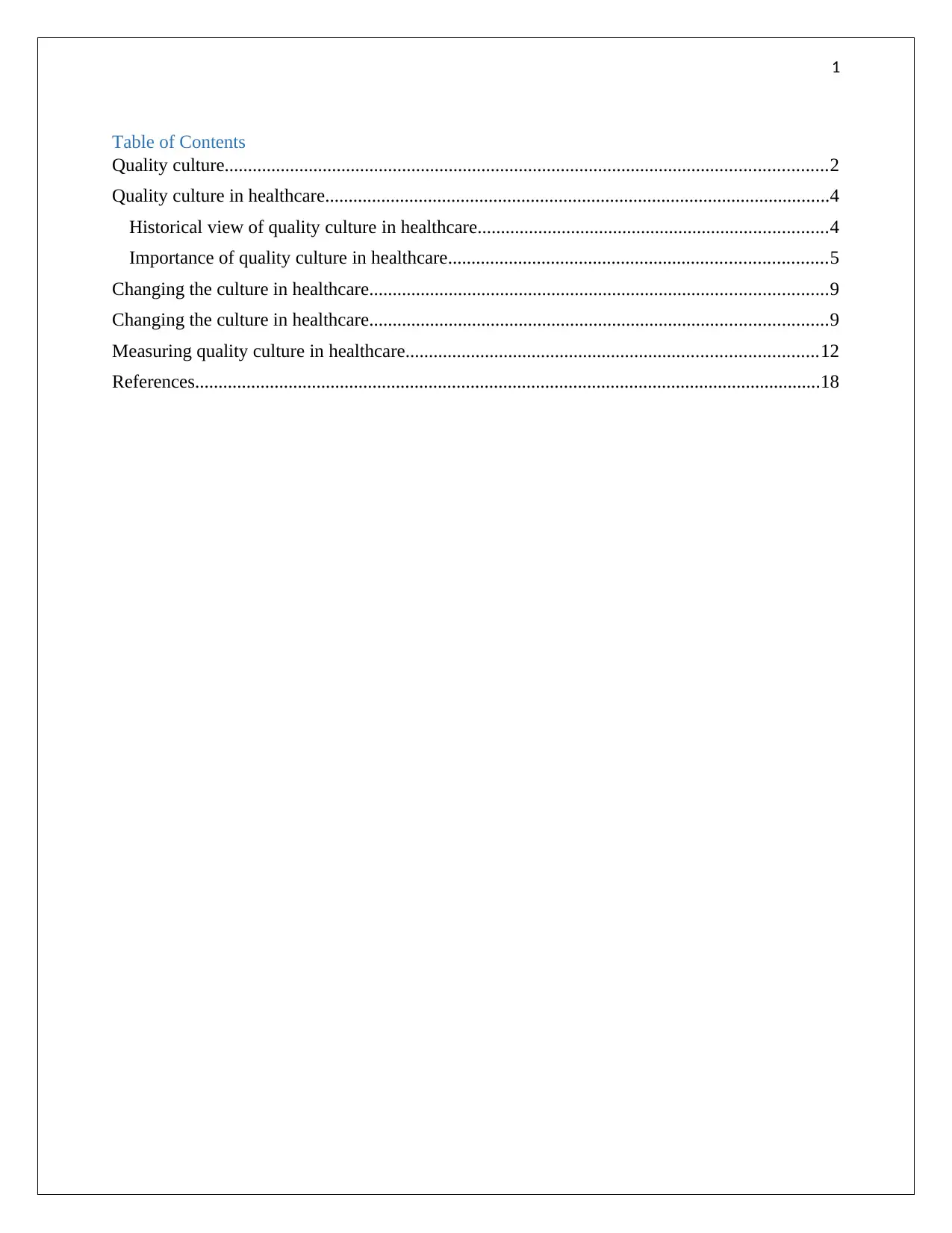
1
Table of Contents
Quality culture.................................................................................................................................2
Quality culture in healthcare............................................................................................................4
Historical view of quality culture in healthcare...........................................................................4
Importance of quality culture in healthcare.................................................................................5
Changing the culture in healthcare..................................................................................................9
Changing the culture in healthcare..................................................................................................9
Measuring quality culture in healthcare........................................................................................12
References......................................................................................................................................18
Table of Contents
Quality culture.................................................................................................................................2
Quality culture in healthcare............................................................................................................4
Historical view of quality culture in healthcare...........................................................................4
Importance of quality culture in healthcare.................................................................................5
Changing the culture in healthcare..................................................................................................9
Changing the culture in healthcare..................................................................................................9
Measuring quality culture in healthcare........................................................................................12
References......................................................................................................................................18
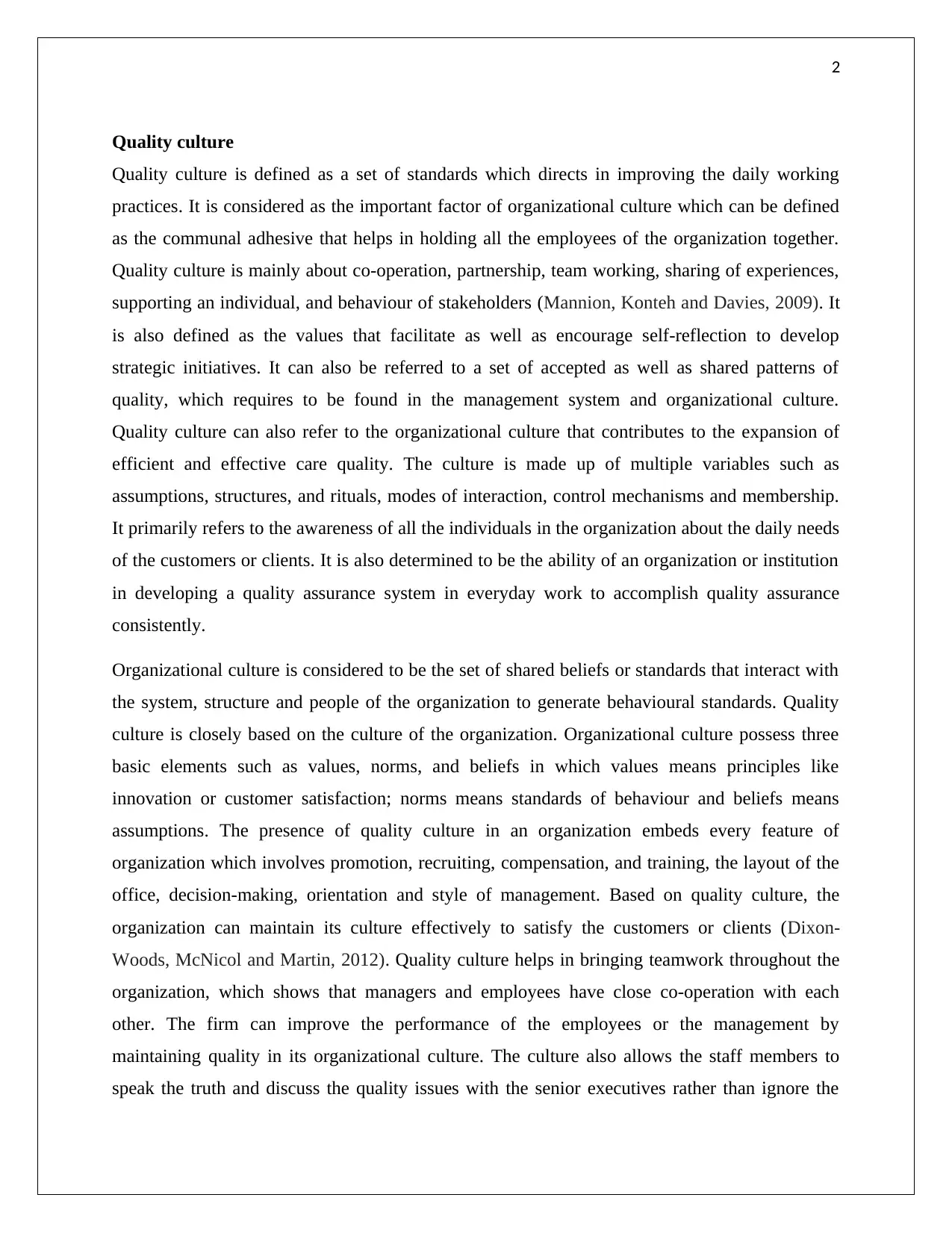
2
Quality culture
Quality culture is defined as a set of standards which directs in improving the daily working
practices. It is considered as the important factor of organizational culture which can be defined
as the communal adhesive that helps in holding all the employees of the organization together.
Quality culture is mainly about co-operation, partnership, team working, sharing of experiences,
supporting an individual, and behaviour of stakeholders (Mannion, Konteh and Davies, 2009). It
is also defined as the values that facilitate as well as encourage self-reflection to develop
strategic initiatives. It can also be referred to a set of accepted as well as shared patterns of
quality, which requires to be found in the management system and organizational culture.
Quality culture can also refer to the organizational culture that contributes to the expansion of
efficient and effective care quality. The culture is made up of multiple variables such as
assumptions, structures, and rituals, modes of interaction, control mechanisms and membership.
It primarily refers to the awareness of all the individuals in the organization about the daily needs
of the customers or clients. It is also determined to be the ability of an organization or institution
in developing a quality assurance system in everyday work to accomplish quality assurance
consistently.
Organizational culture is considered to be the set of shared beliefs or standards that interact with
the system, structure and people of the organization to generate behavioural standards. Quality
culture is closely based on the culture of the organization. Organizational culture possess three
basic elements such as values, norms, and beliefs in which values means principles like
innovation or customer satisfaction; norms means standards of behaviour and beliefs means
assumptions. The presence of quality culture in an organization embeds every feature of
organization which involves promotion, recruiting, compensation, and training, the layout of the
office, decision-making, orientation and style of management. Based on quality culture, the
organization can maintain its culture effectively to satisfy the customers or clients (Dixon-
Woods, McNicol and Martin, 2012). Quality culture helps in bringing teamwork throughout the
organization, which shows that managers and employees have close co-operation with each
other. The firm can improve the performance of the employees or the management by
maintaining quality in its organizational culture. The culture also allows the staff members to
speak the truth and discuss the quality issues with the senior executives rather than ignore the
Quality culture
Quality culture is defined as a set of standards which directs in improving the daily working
practices. It is considered as the important factor of organizational culture which can be defined
as the communal adhesive that helps in holding all the employees of the organization together.
Quality culture is mainly about co-operation, partnership, team working, sharing of experiences,
supporting an individual, and behaviour of stakeholders (Mannion, Konteh and Davies, 2009). It
is also defined as the values that facilitate as well as encourage self-reflection to develop
strategic initiatives. It can also be referred to a set of accepted as well as shared patterns of
quality, which requires to be found in the management system and organizational culture.
Quality culture can also refer to the organizational culture that contributes to the expansion of
efficient and effective care quality. The culture is made up of multiple variables such as
assumptions, structures, and rituals, modes of interaction, control mechanisms and membership.
It primarily refers to the awareness of all the individuals in the organization about the daily needs
of the customers or clients. It is also determined to be the ability of an organization or institution
in developing a quality assurance system in everyday work to accomplish quality assurance
consistently.
Organizational culture is considered to be the set of shared beliefs or standards that interact with
the system, structure and people of the organization to generate behavioural standards. Quality
culture is closely based on the culture of the organization. Organizational culture possess three
basic elements such as values, norms, and beliefs in which values means principles like
innovation or customer satisfaction; norms means standards of behaviour and beliefs means
assumptions. The presence of quality culture in an organization embeds every feature of
organization which involves promotion, recruiting, compensation, and training, the layout of the
office, decision-making, orientation and style of management. Based on quality culture, the
organization can maintain its culture effectively to satisfy the customers or clients (Dixon-
Woods, McNicol and Martin, 2012). Quality culture helps in bringing teamwork throughout the
organization, which shows that managers and employees have close co-operation with each
other. The firm can improve the performance of the employees or the management by
maintaining quality in its organizational culture. The culture also allows the staff members to
speak the truth and discuss the quality issues with the senior executives rather than ignore the
⊘ This is a preview!⊘
Do you want full access?
Subscribe today to unlock all pages.

Trusted by 1+ million students worldwide
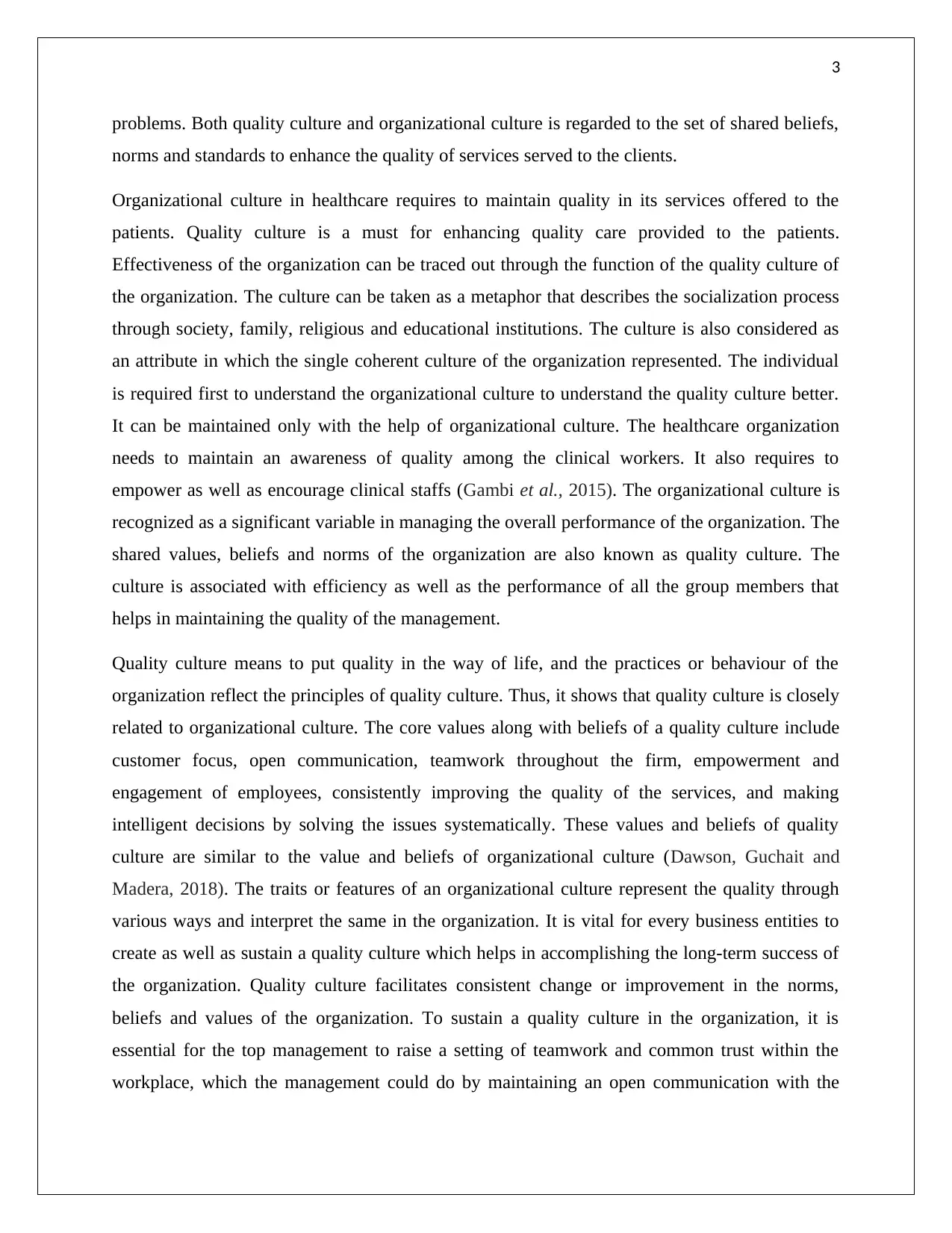
3
problems. Both quality culture and organizational culture is regarded to the set of shared beliefs,
norms and standards to enhance the quality of services served to the clients.
Organizational culture in healthcare requires to maintain quality in its services offered to the
patients. Quality culture is a must for enhancing quality care provided to the patients.
Effectiveness of the organization can be traced out through the function of the quality culture of
the organization. The culture can be taken as a metaphor that describes the socialization process
through society, family, religious and educational institutions. The culture is also considered as
an attribute in which the single coherent culture of the organization represented. The individual
is required first to understand the organizational culture to understand the quality culture better.
It can be maintained only with the help of organizational culture. The healthcare organization
needs to maintain an awareness of quality among the clinical workers. It also requires to
empower as well as encourage clinical staffs (Gambi et al., 2015). The organizational culture is
recognized as a significant variable in managing the overall performance of the organization. The
shared values, beliefs and norms of the organization are also known as quality culture. The
culture is associated with efficiency as well as the performance of all the group members that
helps in maintaining the quality of the management.
Quality culture means to put quality in the way of life, and the practices or behaviour of the
organization reflect the principles of quality culture. Thus, it shows that quality culture is closely
related to organizational culture. The core values along with beliefs of a quality culture include
customer focus, open communication, teamwork throughout the firm, empowerment and
engagement of employees, consistently improving the quality of the services, and making
intelligent decisions by solving the issues systematically. These values and beliefs of quality
culture are similar to the value and beliefs of organizational culture (Dawson, Guchait and
Madera, 2018). The traits or features of an organizational culture represent the quality through
various ways and interpret the same in the organization. It is vital for every business entities to
create as well as sustain a quality culture which helps in accomplishing the long-term success of
the organization. Quality culture facilitates consistent change or improvement in the norms,
beliefs and values of the organization. To sustain a quality culture in the organization, it is
essential for the top management to raise a setting of teamwork and common trust within the
workplace, which the management could do by maintaining an open communication with the
problems. Both quality culture and organizational culture is regarded to the set of shared beliefs,
norms and standards to enhance the quality of services served to the clients.
Organizational culture in healthcare requires to maintain quality in its services offered to the
patients. Quality culture is a must for enhancing quality care provided to the patients.
Effectiveness of the organization can be traced out through the function of the quality culture of
the organization. The culture can be taken as a metaphor that describes the socialization process
through society, family, religious and educational institutions. The culture is also considered as
an attribute in which the single coherent culture of the organization represented. The individual
is required first to understand the organizational culture to understand the quality culture better.
It can be maintained only with the help of organizational culture. The healthcare organization
needs to maintain an awareness of quality among the clinical workers. It also requires to
empower as well as encourage clinical staffs (Gambi et al., 2015). The organizational culture is
recognized as a significant variable in managing the overall performance of the organization. The
shared values, beliefs and norms of the organization are also known as quality culture. The
culture is associated with efficiency as well as the performance of all the group members that
helps in maintaining the quality of the management.
Quality culture means to put quality in the way of life, and the practices or behaviour of the
organization reflect the principles of quality culture. Thus, it shows that quality culture is closely
related to organizational culture. The core values along with beliefs of a quality culture include
customer focus, open communication, teamwork throughout the firm, empowerment and
engagement of employees, consistently improving the quality of the services, and making
intelligent decisions by solving the issues systematically. These values and beliefs of quality
culture are similar to the value and beliefs of organizational culture (Dawson, Guchait and
Madera, 2018). The traits or features of an organizational culture represent the quality through
various ways and interpret the same in the organization. It is vital for every business entities to
create as well as sustain a quality culture which helps in accomplishing the long-term success of
the organization. Quality culture facilitates consistent change or improvement in the norms,
beliefs and values of the organization. To sustain a quality culture in the organization, it is
essential for the top management to raise a setting of teamwork and common trust within the
workplace, which the management could do by maintaining an open communication with the
Paraphrase This Document
Need a fresh take? Get an instant paraphrase of this document with our AI Paraphraser
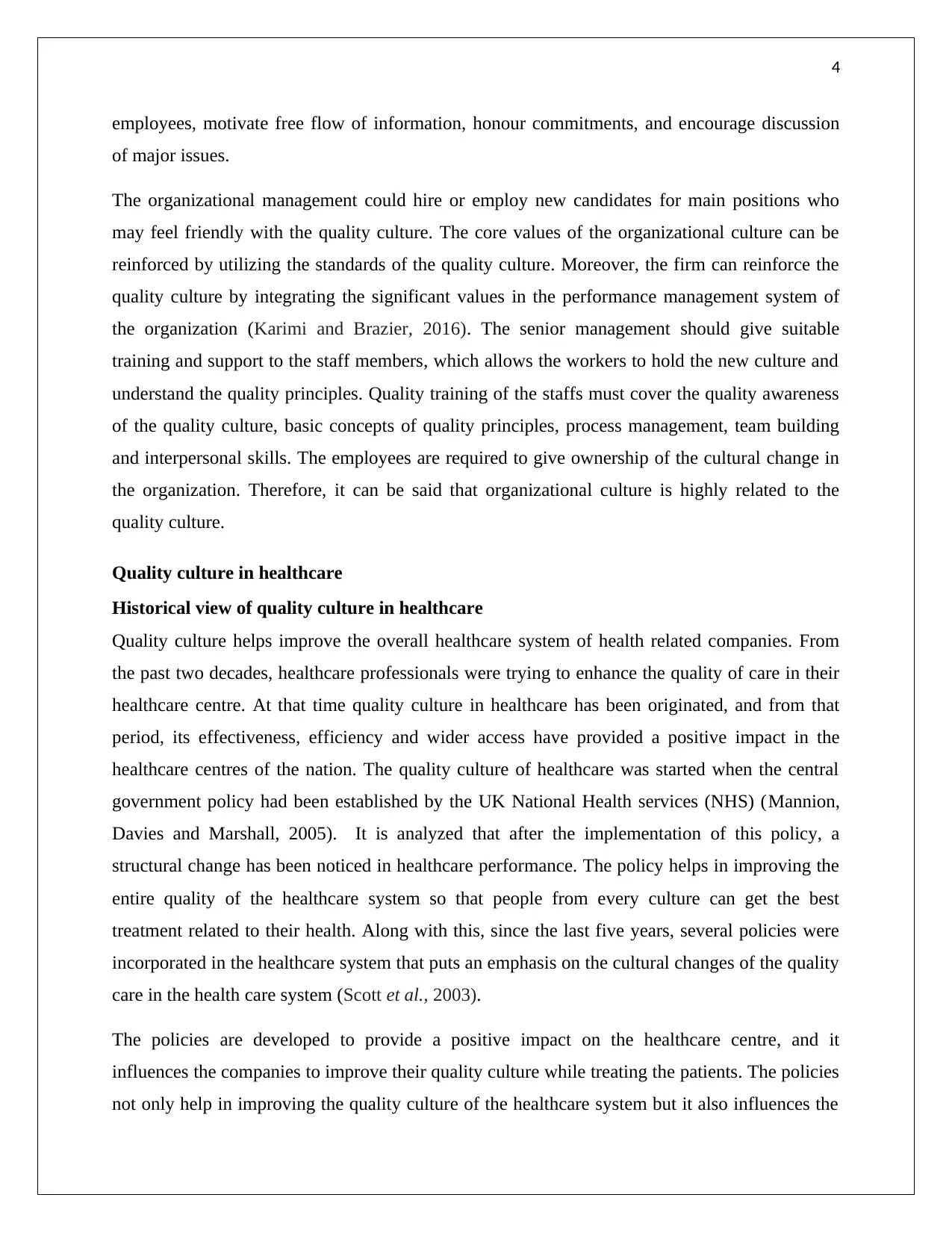
4
employees, motivate free flow of information, honour commitments, and encourage discussion
of major issues.
The organizational management could hire or employ new candidates for main positions who
may feel friendly with the quality culture. The core values of the organizational culture can be
reinforced by utilizing the standards of the quality culture. Moreover, the firm can reinforce the
quality culture by integrating the significant values in the performance management system of
the organization (Karimi and Brazier, 2016). The senior management should give suitable
training and support to the staff members, which allows the workers to hold the new culture and
understand the quality principles. Quality training of the staffs must cover the quality awareness
of the quality culture, basic concepts of quality principles, process management, team building
and interpersonal skills. The employees are required to give ownership of the cultural change in
the organization. Therefore, it can be said that organizational culture is highly related to the
quality culture.
Quality culture in healthcare
Historical view of quality culture in healthcare
Quality culture helps improve the overall healthcare system of health related companies. From
the past two decades, healthcare professionals were trying to enhance the quality of care in their
healthcare centre. At that time quality culture in healthcare has been originated, and from that
period, its effectiveness, efficiency and wider access have provided a positive impact in the
healthcare centres of the nation. The quality culture of healthcare was started when the central
government policy had been established by the UK National Health services (NHS) (Mannion,
Davies and Marshall, 2005). It is analyzed that after the implementation of this policy, a
structural change has been noticed in healthcare performance. The policy helps in improving the
entire quality of the healthcare system so that people from every culture can get the best
treatment related to their health. Along with this, since the last five years, several policies were
incorporated in the healthcare system that puts an emphasis on the cultural changes of the quality
care in the health care system (Scott et al., 2003).
The policies are developed to provide a positive impact on the healthcare centre, and it
influences the companies to improve their quality culture while treating the patients. The policies
not only help in improving the quality culture of the healthcare system but it also influences the
employees, motivate free flow of information, honour commitments, and encourage discussion
of major issues.
The organizational management could hire or employ new candidates for main positions who
may feel friendly with the quality culture. The core values of the organizational culture can be
reinforced by utilizing the standards of the quality culture. Moreover, the firm can reinforce the
quality culture by integrating the significant values in the performance management system of
the organization (Karimi and Brazier, 2016). The senior management should give suitable
training and support to the staff members, which allows the workers to hold the new culture and
understand the quality principles. Quality training of the staffs must cover the quality awareness
of the quality culture, basic concepts of quality principles, process management, team building
and interpersonal skills. The employees are required to give ownership of the cultural change in
the organization. Therefore, it can be said that organizational culture is highly related to the
quality culture.
Quality culture in healthcare
Historical view of quality culture in healthcare
Quality culture helps improve the overall healthcare system of health related companies. From
the past two decades, healthcare professionals were trying to enhance the quality of care in their
healthcare centre. At that time quality culture in healthcare has been originated, and from that
period, its effectiveness, efficiency and wider access have provided a positive impact in the
healthcare centres of the nation. The quality culture of healthcare was started when the central
government policy had been established by the UK National Health services (NHS) (Mannion,
Davies and Marshall, 2005). It is analyzed that after the implementation of this policy, a
structural change has been noticed in healthcare performance. The policy helps in improving the
entire quality of the healthcare system so that people from every culture can get the best
treatment related to their health. Along with this, since the last five years, several policies were
incorporated in the healthcare system that puts an emphasis on the cultural changes of the quality
care in the health care system (Scott et al., 2003).
The policies are developed to provide a positive impact on the healthcare centre, and it
influences the companies to improve their quality culture while treating the patients. The policies
not only help in improving the quality culture of the healthcare system but it also influences the
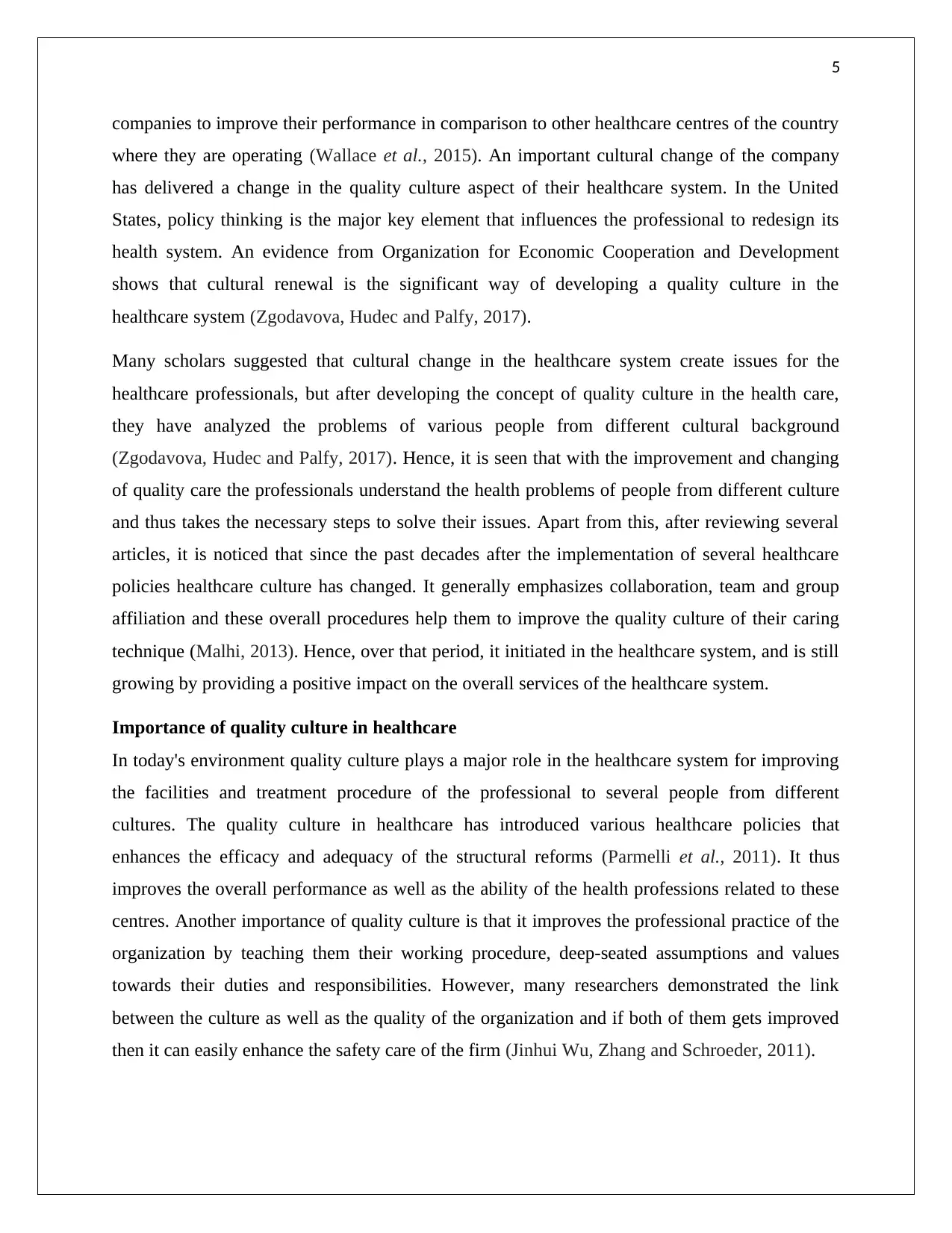
5
companies to improve their performance in comparison to other healthcare centres of the country
where they are operating (Wallace et al., 2015). An important cultural change of the company
has delivered a change in the quality culture aspect of their healthcare system. In the United
States, policy thinking is the major key element that influences the professional to redesign its
health system. An evidence from Organization for Economic Cooperation and Development
shows that cultural renewal is the significant way of developing a quality culture in the
healthcare system (Zgodavova, Hudec and Palfy, 2017).
Many scholars suggested that cultural change in the healthcare system create issues for the
healthcare professionals, but after developing the concept of quality culture in the health care,
they have analyzed the problems of various people from different cultural background
(Zgodavova, Hudec and Palfy, 2017). Hence, it is seen that with the improvement and changing
of quality care the professionals understand the health problems of people from different culture
and thus takes the necessary steps to solve their issues. Apart from this, after reviewing several
articles, it is noticed that since the past decades after the implementation of several healthcare
policies healthcare culture has changed. It generally emphasizes collaboration, team and group
affiliation and these overall procedures help them to improve the quality culture of their caring
technique (Malhi, 2013). Hence, over that period, it initiated in the healthcare system, and is still
growing by providing a positive impact on the overall services of the healthcare system.
Importance of quality culture in healthcare
In today's environment quality culture plays a major role in the healthcare system for improving
the facilities and treatment procedure of the professional to several people from different
cultures. The quality culture in healthcare has introduced various healthcare policies that
enhances the efficacy and adequacy of the structural reforms (Parmelli et al., 2011). It thus
improves the overall performance as well as the ability of the health professions related to these
centres. Another importance of quality culture is that it improves the professional practice of the
organization by teaching them their working procedure, deep-seated assumptions and values
towards their duties and responsibilities. However, many researchers demonstrated the link
between the culture as well as the quality of the organization and if both of them gets improved
then it can easily enhance the safety care of the firm (Jinhui Wu, Zhang and Schroeder, 2011).
companies to improve their performance in comparison to other healthcare centres of the country
where they are operating (Wallace et al., 2015). An important cultural change of the company
has delivered a change in the quality culture aspect of their healthcare system. In the United
States, policy thinking is the major key element that influences the professional to redesign its
health system. An evidence from Organization for Economic Cooperation and Development
shows that cultural renewal is the significant way of developing a quality culture in the
healthcare system (Zgodavova, Hudec and Palfy, 2017).
Many scholars suggested that cultural change in the healthcare system create issues for the
healthcare professionals, but after developing the concept of quality culture in the health care,
they have analyzed the problems of various people from different cultural background
(Zgodavova, Hudec and Palfy, 2017). Hence, it is seen that with the improvement and changing
of quality care the professionals understand the health problems of people from different culture
and thus takes the necessary steps to solve their issues. Apart from this, after reviewing several
articles, it is noticed that since the past decades after the implementation of several healthcare
policies healthcare culture has changed. It generally emphasizes collaboration, team and group
affiliation and these overall procedures help them to improve the quality culture of their caring
technique (Malhi, 2013). Hence, over that period, it initiated in the healthcare system, and is still
growing by providing a positive impact on the overall services of the healthcare system.
Importance of quality culture in healthcare
In today's environment quality culture plays a major role in the healthcare system for improving
the facilities and treatment procedure of the professional to several people from different
cultures. The quality culture in healthcare has introduced various healthcare policies that
enhances the efficacy and adequacy of the structural reforms (Parmelli et al., 2011). It thus
improves the overall performance as well as the ability of the health professions related to these
centres. Another importance of quality culture is that it improves the professional practice of the
organization by teaching them their working procedure, deep-seated assumptions and values
towards their duties and responsibilities. However, many researchers demonstrated the link
between the culture as well as the quality of the organization and if both of them gets improved
then it can easily enhance the safety care of the firm (Jinhui Wu, Zhang and Schroeder, 2011).
⊘ This is a preview!⊘
Do you want full access?
Subscribe today to unlock all pages.

Trusted by 1+ million students worldwide
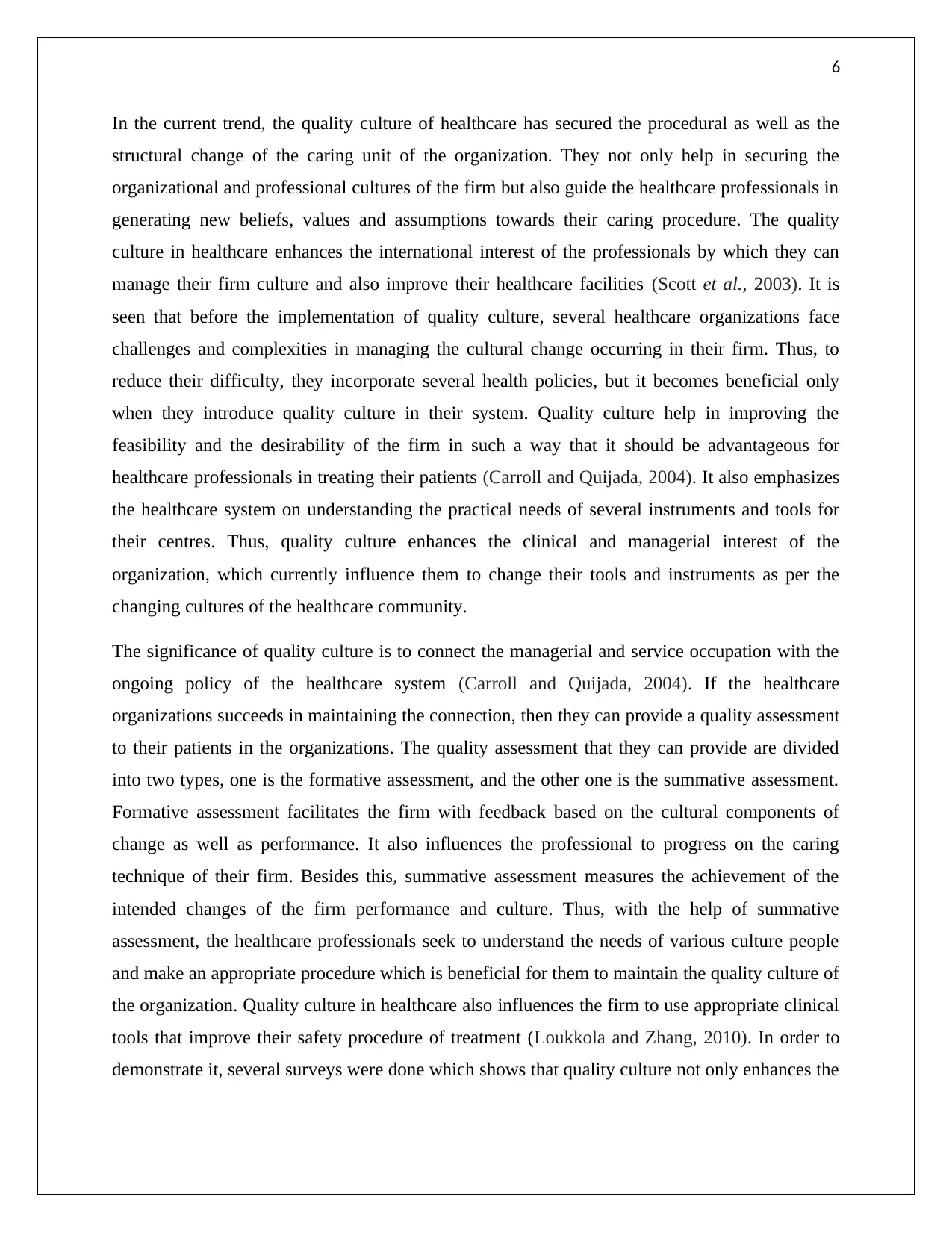
6
In the current trend, the quality culture of healthcare has secured the procedural as well as the
structural change of the caring unit of the organization. They not only help in securing the
organizational and professional cultures of the firm but also guide the healthcare professionals in
generating new beliefs, values and assumptions towards their caring procedure. The quality
culture in healthcare enhances the international interest of the professionals by which they can
manage their firm culture and also improve their healthcare facilities (Scott et al., 2003). It is
seen that before the implementation of quality culture, several healthcare organizations face
challenges and complexities in managing the cultural change occurring in their firm. Thus, to
reduce their difficulty, they incorporate several health policies, but it becomes beneficial only
when they introduce quality culture in their system. Quality culture help in improving the
feasibility and the desirability of the firm in such a way that it should be advantageous for
healthcare professionals in treating their patients (Carroll and Quijada, 2004). It also emphasizes
the healthcare system on understanding the practical needs of several instruments and tools for
their centres. Thus, quality culture enhances the clinical and managerial interest of the
organization, which currently influence them to change their tools and instruments as per the
changing cultures of the healthcare community.
The significance of quality culture is to connect the managerial and service occupation with the
ongoing policy of the healthcare system (Carroll and Quijada, 2004). If the healthcare
organizations succeeds in maintaining the connection, then they can provide a quality assessment
to their patients in the organizations. The quality assessment that they can provide are divided
into two types, one is the formative assessment, and the other one is the summative assessment.
Formative assessment facilitates the firm with feedback based on the cultural components of
change as well as performance. It also influences the professional to progress on the caring
technique of their firm. Besides this, summative assessment measures the achievement of the
intended changes of the firm performance and culture. Thus, with the help of summative
assessment, the healthcare professionals seek to understand the needs of various culture people
and make an appropriate procedure which is beneficial for them to maintain the quality culture of
the organization. Quality culture in healthcare also influences the firm to use appropriate clinical
tools that improve their safety procedure of treatment (Loukkola and Zhang, 2010). In order to
demonstrate it, several surveys were done which shows that quality culture not only enhances the
In the current trend, the quality culture of healthcare has secured the procedural as well as the
structural change of the caring unit of the organization. They not only help in securing the
organizational and professional cultures of the firm but also guide the healthcare professionals in
generating new beliefs, values and assumptions towards their caring procedure. The quality
culture in healthcare enhances the international interest of the professionals by which they can
manage their firm culture and also improve their healthcare facilities (Scott et al., 2003). It is
seen that before the implementation of quality culture, several healthcare organizations face
challenges and complexities in managing the cultural change occurring in their firm. Thus, to
reduce their difficulty, they incorporate several health policies, but it becomes beneficial only
when they introduce quality culture in their system. Quality culture help in improving the
feasibility and the desirability of the firm in such a way that it should be advantageous for
healthcare professionals in treating their patients (Carroll and Quijada, 2004). It also emphasizes
the healthcare system on understanding the practical needs of several instruments and tools for
their centres. Thus, quality culture enhances the clinical and managerial interest of the
organization, which currently influence them to change their tools and instruments as per the
changing cultures of the healthcare community.
The significance of quality culture is to connect the managerial and service occupation with the
ongoing policy of the healthcare system (Carroll and Quijada, 2004). If the healthcare
organizations succeeds in maintaining the connection, then they can provide a quality assessment
to their patients in the organizations. The quality assessment that they can provide are divided
into two types, one is the formative assessment, and the other one is the summative assessment.
Formative assessment facilitates the firm with feedback based on the cultural components of
change as well as performance. It also influences the professional to progress on the caring
technique of their firm. Besides this, summative assessment measures the achievement of the
intended changes of the firm performance and culture. Thus, with the help of summative
assessment, the healthcare professionals seek to understand the needs of various culture people
and make an appropriate procedure which is beneficial for them to maintain the quality culture of
the organization. Quality culture in healthcare also influences the firm to use appropriate clinical
tools that improve their safety procedure of treatment (Loukkola and Zhang, 2010). In order to
demonstrate it, several surveys were done which shows that quality culture not only enhances the
Paraphrase This Document
Need a fresh take? Get an instant paraphrase of this document with our AI Paraphraser
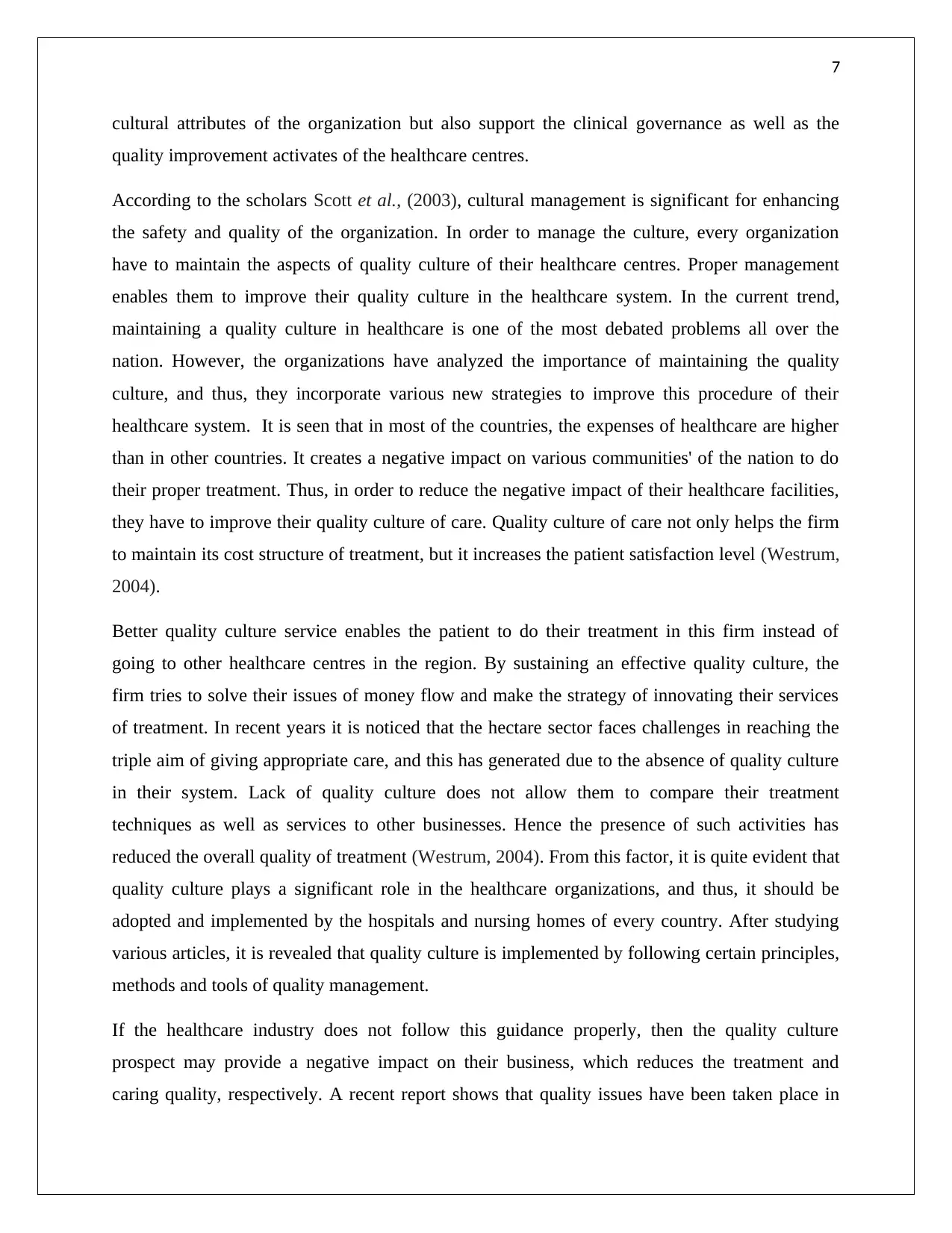
7
cultural attributes of the organization but also support the clinical governance as well as the
quality improvement activates of the healthcare centres.
According to the scholars Scott et al., (2003), cultural management is significant for enhancing
the safety and quality of the organization. In order to manage the culture, every organization
have to maintain the aspects of quality culture of their healthcare centres. Proper management
enables them to improve their quality culture in the healthcare system. In the current trend,
maintaining a quality culture in healthcare is one of the most debated problems all over the
nation. However, the organizations have analyzed the importance of maintaining the quality
culture, and thus, they incorporate various new strategies to improve this procedure of their
healthcare system. It is seen that in most of the countries, the expenses of healthcare are higher
than in other countries. It creates a negative impact on various communities' of the nation to do
their proper treatment. Thus, in order to reduce the negative impact of their healthcare facilities,
they have to improve their quality culture of care. Quality culture of care not only helps the firm
to maintain its cost structure of treatment, but it increases the patient satisfaction level (Westrum,
2004).
Better quality culture service enables the patient to do their treatment in this firm instead of
going to other healthcare centres in the region. By sustaining an effective quality culture, the
firm tries to solve their issues of money flow and make the strategy of innovating their services
of treatment. In recent years it is noticed that the hectare sector faces challenges in reaching the
triple aim of giving appropriate care, and this has generated due to the absence of quality culture
in their system. Lack of quality culture does not allow them to compare their treatment
techniques as well as services to other businesses. Hence the presence of such activities has
reduced the overall quality of treatment (Westrum, 2004). From this factor, it is quite evident that
quality culture plays a significant role in the healthcare organizations, and thus, it should be
adopted and implemented by the hospitals and nursing homes of every country. After studying
various articles, it is revealed that quality culture is implemented by following certain principles,
methods and tools of quality management.
If the healthcare industry does not follow this guidance properly, then the quality culture
prospect may provide a negative impact on their business, which reduces the treatment and
caring quality, respectively. A recent report shows that quality issues have been taken place in
cultural attributes of the organization but also support the clinical governance as well as the
quality improvement activates of the healthcare centres.
According to the scholars Scott et al., (2003), cultural management is significant for enhancing
the safety and quality of the organization. In order to manage the culture, every organization
have to maintain the aspects of quality culture of their healthcare centres. Proper management
enables them to improve their quality culture in the healthcare system. In the current trend,
maintaining a quality culture in healthcare is one of the most debated problems all over the
nation. However, the organizations have analyzed the importance of maintaining the quality
culture, and thus, they incorporate various new strategies to improve this procedure of their
healthcare system. It is seen that in most of the countries, the expenses of healthcare are higher
than in other countries. It creates a negative impact on various communities' of the nation to do
their proper treatment. Thus, in order to reduce the negative impact of their healthcare facilities,
they have to improve their quality culture of care. Quality culture of care not only helps the firm
to maintain its cost structure of treatment, but it increases the patient satisfaction level (Westrum,
2004).
Better quality culture service enables the patient to do their treatment in this firm instead of
going to other healthcare centres in the region. By sustaining an effective quality culture, the
firm tries to solve their issues of money flow and make the strategy of innovating their services
of treatment. In recent years it is noticed that the hectare sector faces challenges in reaching the
triple aim of giving appropriate care, and this has generated due to the absence of quality culture
in their system. Lack of quality culture does not allow them to compare their treatment
techniques as well as services to other businesses. Hence the presence of such activities has
reduced the overall quality of treatment (Westrum, 2004). From this factor, it is quite evident that
quality culture plays a significant role in the healthcare organizations, and thus, it should be
adopted and implemented by the hospitals and nursing homes of every country. After studying
various articles, it is revealed that quality culture is implemented by following certain principles,
methods and tools of quality management.
If the healthcare industry does not follow this guidance properly, then the quality culture
prospect may provide a negative impact on their business, which reduces the treatment and
caring quality, respectively. A recent report shows that quality issues have been taken place in
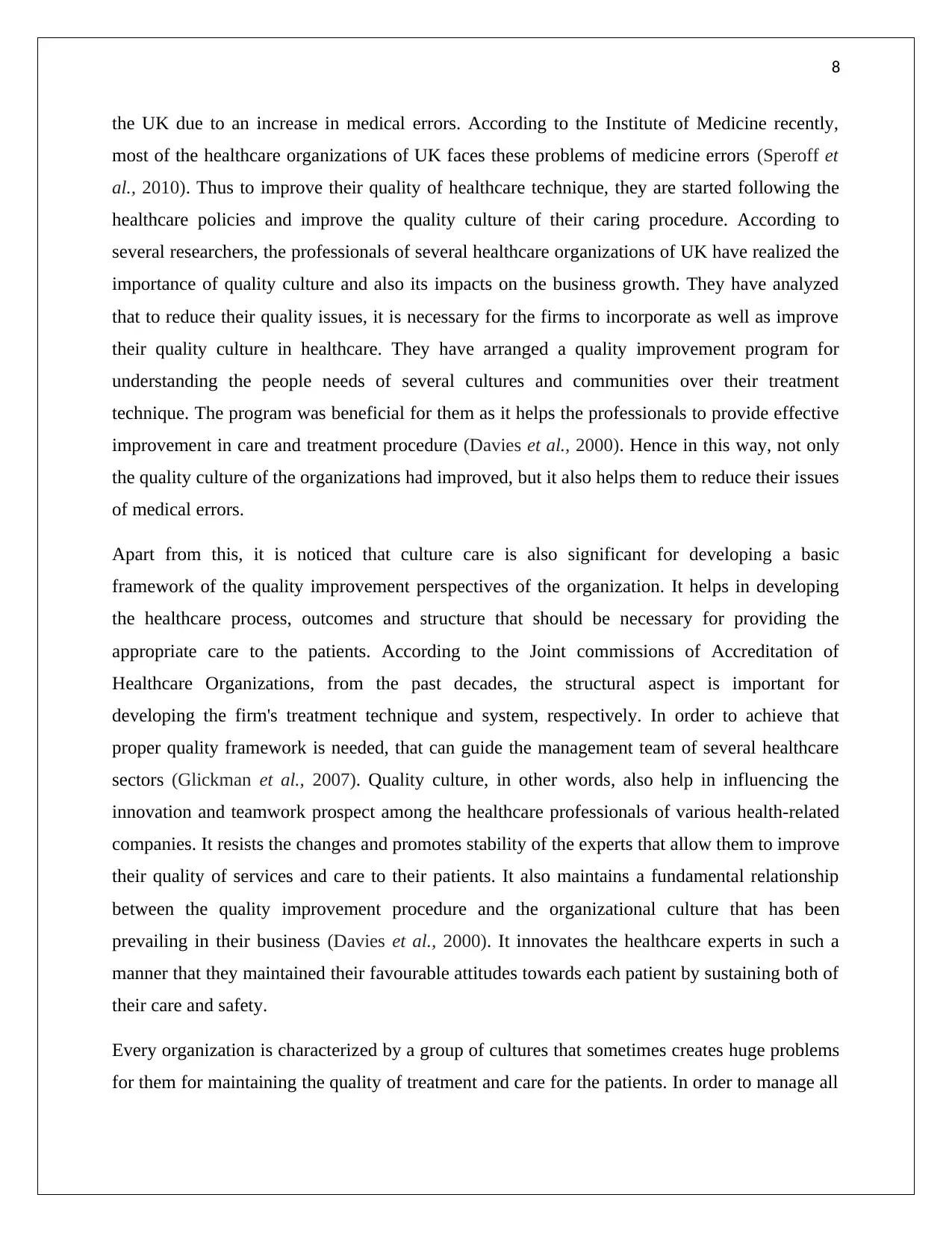
8
the UK due to an increase in medical errors. According to the Institute of Medicine recently,
most of the healthcare organizations of UK faces these problems of medicine errors (Speroff et
al., 2010). Thus to improve their quality of healthcare technique, they are started following the
healthcare policies and improve the quality culture of their caring procedure. According to
several researchers, the professionals of several healthcare organizations of UK have realized the
importance of quality culture and also its impacts on the business growth. They have analyzed
that to reduce their quality issues, it is necessary for the firms to incorporate as well as improve
their quality culture in healthcare. They have arranged a quality improvement program for
understanding the people needs of several cultures and communities over their treatment
technique. The program was beneficial for them as it helps the professionals to provide effective
improvement in care and treatment procedure (Davies et al., 2000). Hence in this way, not only
the quality culture of the organizations had improved, but it also helps them to reduce their issues
of medical errors.
Apart from this, it is noticed that culture care is also significant for developing a basic
framework of the quality improvement perspectives of the organization. It helps in developing
the healthcare process, outcomes and structure that should be necessary for providing the
appropriate care to the patients. According to the Joint commissions of Accreditation of
Healthcare Organizations, from the past decades, the structural aspect is important for
developing the firm's treatment technique and system, respectively. In order to achieve that
proper quality framework is needed, that can guide the management team of several healthcare
sectors (Glickman et al., 2007). Quality culture, in other words, also help in influencing the
innovation and teamwork prospect among the healthcare professionals of various health-related
companies. It resists the changes and promotes stability of the experts that allow them to improve
their quality of services and care to their patients. It also maintains a fundamental relationship
between the quality improvement procedure and the organizational culture that has been
prevailing in their business (Davies et al., 2000). It innovates the healthcare experts in such a
manner that they maintained their favourable attitudes towards each patient by sustaining both of
their care and safety.
Every organization is characterized by a group of cultures that sometimes creates huge problems
for them for maintaining the quality of treatment and care for the patients. In order to manage all
the UK due to an increase in medical errors. According to the Institute of Medicine recently,
most of the healthcare organizations of UK faces these problems of medicine errors (Speroff et
al., 2010). Thus to improve their quality of healthcare technique, they are started following the
healthcare policies and improve the quality culture of their caring procedure. According to
several researchers, the professionals of several healthcare organizations of UK have realized the
importance of quality culture and also its impacts on the business growth. They have analyzed
that to reduce their quality issues, it is necessary for the firms to incorporate as well as improve
their quality culture in healthcare. They have arranged a quality improvement program for
understanding the people needs of several cultures and communities over their treatment
technique. The program was beneficial for them as it helps the professionals to provide effective
improvement in care and treatment procedure (Davies et al., 2000). Hence in this way, not only
the quality culture of the organizations had improved, but it also helps them to reduce their issues
of medical errors.
Apart from this, it is noticed that culture care is also significant for developing a basic
framework of the quality improvement perspectives of the organization. It helps in developing
the healthcare process, outcomes and structure that should be necessary for providing the
appropriate care to the patients. According to the Joint commissions of Accreditation of
Healthcare Organizations, from the past decades, the structural aspect is important for
developing the firm's treatment technique and system, respectively. In order to achieve that
proper quality framework is needed, that can guide the management team of several healthcare
sectors (Glickman et al., 2007). Quality culture, in other words, also help in influencing the
innovation and teamwork prospect among the healthcare professionals of various health-related
companies. It resists the changes and promotes stability of the experts that allow them to improve
their quality of services and care to their patients. It also maintains a fundamental relationship
between the quality improvement procedure and the organizational culture that has been
prevailing in their business (Davies et al., 2000). It innovates the healthcare experts in such a
manner that they maintained their favourable attitudes towards each patient by sustaining both of
their care and safety.
Every organization is characterized by a group of cultures that sometimes creates huge problems
for them for maintaining the quality of treatment and care for the patients. In order to manage all
⊘ This is a preview!⊘
Do you want full access?
Subscribe today to unlock all pages.

Trusted by 1+ million students worldwide
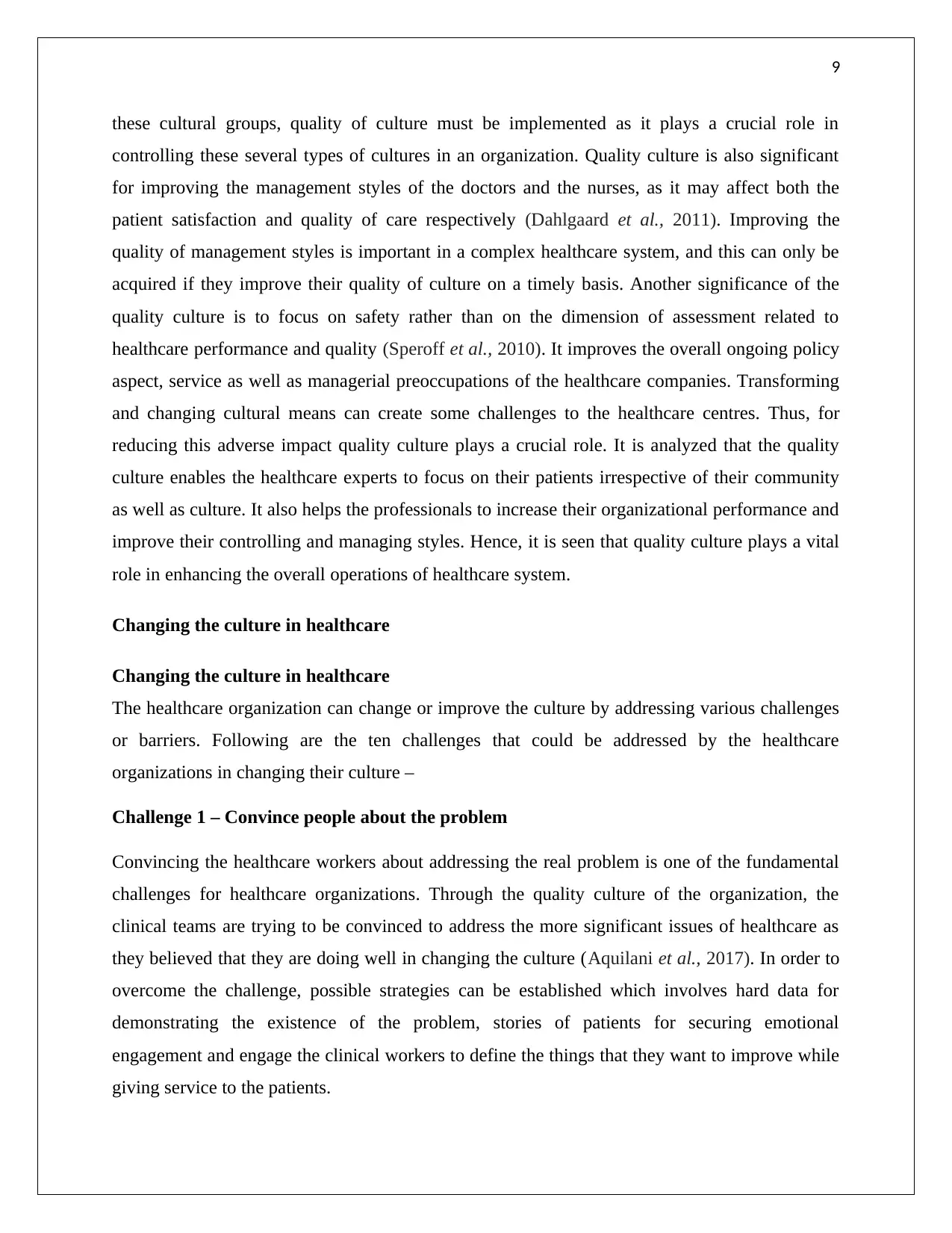
9
these cultural groups, quality of culture must be implemented as it plays a crucial role in
controlling these several types of cultures in an organization. Quality culture is also significant
for improving the management styles of the doctors and the nurses, as it may affect both the
patient satisfaction and quality of care respectively (Dahlgaard et al., 2011). Improving the
quality of management styles is important in a complex healthcare system, and this can only be
acquired if they improve their quality of culture on a timely basis. Another significance of the
quality culture is to focus on safety rather than on the dimension of assessment related to
healthcare performance and quality (Speroff et al., 2010). It improves the overall ongoing policy
aspect, service as well as managerial preoccupations of the healthcare companies. Transforming
and changing cultural means can create some challenges to the healthcare centres. Thus, for
reducing this adverse impact quality culture plays a crucial role. It is analyzed that the quality
culture enables the healthcare experts to focus on their patients irrespective of their community
as well as culture. It also helps the professionals to increase their organizational performance and
improve their controlling and managing styles. Hence, it is seen that quality culture plays a vital
role in enhancing the overall operations of healthcare system.
Changing the culture in healthcare
Changing the culture in healthcare
The healthcare organization can change or improve the culture by addressing various challenges
or barriers. Following are the ten challenges that could be addressed by the healthcare
organizations in changing their culture –
Challenge 1 – Convince people about the problem
Convincing the healthcare workers about addressing the real problem is one of the fundamental
challenges for healthcare organizations. Through the quality culture of the organization, the
clinical teams are trying to be convinced to address the more significant issues of healthcare as
they believed that they are doing well in changing the culture (Aquilani et al., 2017). In order to
overcome the challenge, possible strategies can be established which involves hard data for
demonstrating the existence of the problem, stories of patients for securing emotional
engagement and engage the clinical workers to define the things that they want to improve while
giving service to the patients.
these cultural groups, quality of culture must be implemented as it plays a crucial role in
controlling these several types of cultures in an organization. Quality culture is also significant
for improving the management styles of the doctors and the nurses, as it may affect both the
patient satisfaction and quality of care respectively (Dahlgaard et al., 2011). Improving the
quality of management styles is important in a complex healthcare system, and this can only be
acquired if they improve their quality of culture on a timely basis. Another significance of the
quality culture is to focus on safety rather than on the dimension of assessment related to
healthcare performance and quality (Speroff et al., 2010). It improves the overall ongoing policy
aspect, service as well as managerial preoccupations of the healthcare companies. Transforming
and changing cultural means can create some challenges to the healthcare centres. Thus, for
reducing this adverse impact quality culture plays a crucial role. It is analyzed that the quality
culture enables the healthcare experts to focus on their patients irrespective of their community
as well as culture. It also helps the professionals to increase their organizational performance and
improve their controlling and managing styles. Hence, it is seen that quality culture plays a vital
role in enhancing the overall operations of healthcare system.
Changing the culture in healthcare
Changing the culture in healthcare
The healthcare organization can change or improve the culture by addressing various challenges
or barriers. Following are the ten challenges that could be addressed by the healthcare
organizations in changing their culture –
Challenge 1 – Convince people about the problem
Convincing the healthcare workers about addressing the real problem is one of the fundamental
challenges for healthcare organizations. Through the quality culture of the organization, the
clinical teams are trying to be convinced to address the more significant issues of healthcare as
they believed that they are doing well in changing the culture (Aquilani et al., 2017). In order to
overcome the challenge, possible strategies can be established which involves hard data for
demonstrating the existence of the problem, stories of patients for securing emotional
engagement and engage the clinical workers to define the things that they want to improve while
giving service to the patients.
Paraphrase This Document
Need a fresh take? Get an instant paraphrase of this document with our AI Paraphraser
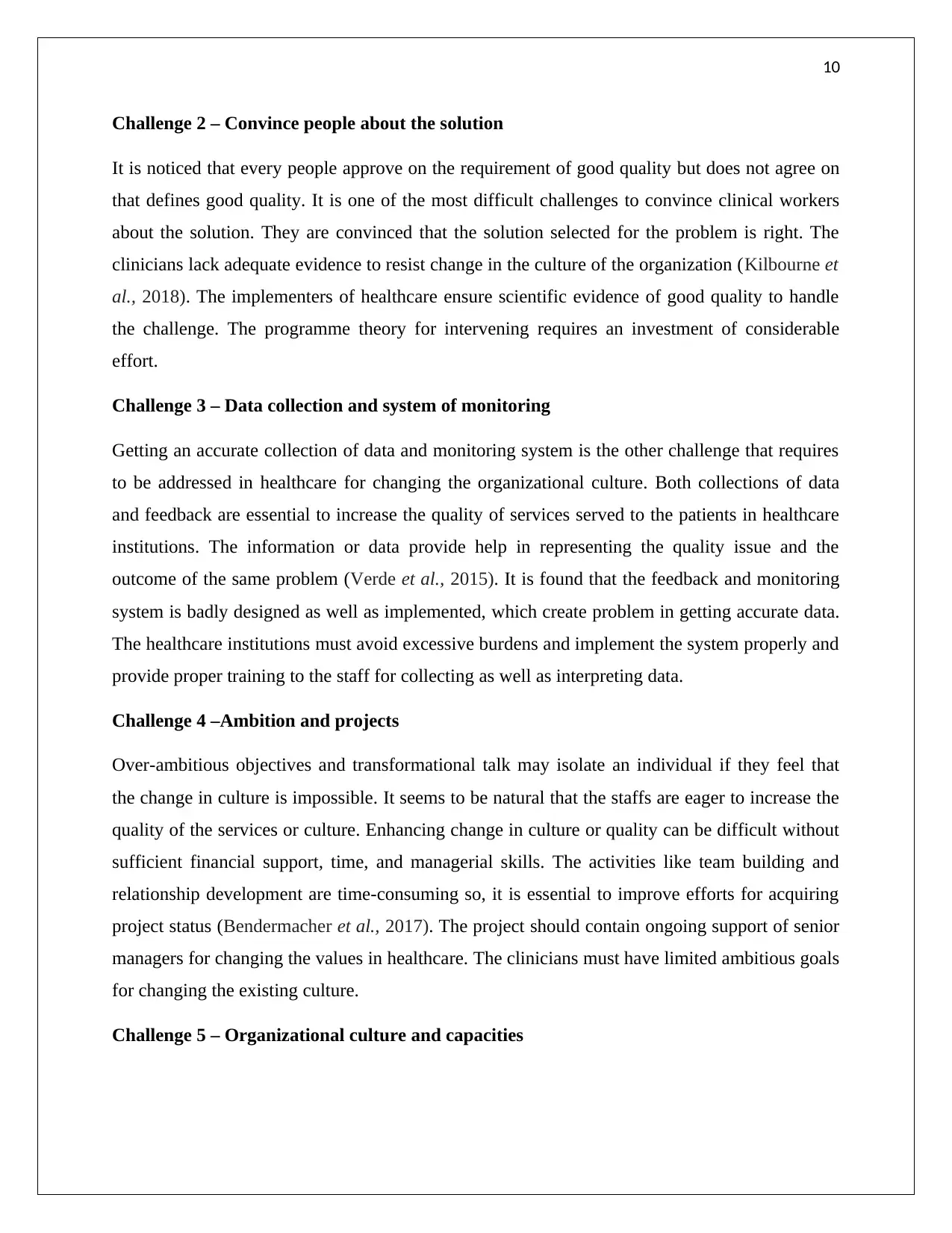
10
Challenge 2 – Convince people about the solution
It is noticed that every people approve on the requirement of good quality but does not agree on
that defines good quality. It is one of the most difficult challenges to convince clinical workers
about the solution. They are convinced that the solution selected for the problem is right. The
clinicians lack adequate evidence to resist change in the culture of the organization (Kilbourne et
al., 2018). The implementers of healthcare ensure scientific evidence of good quality to handle
the challenge. The programme theory for intervening requires an investment of considerable
effort.
Challenge 3 – Data collection and system of monitoring
Getting an accurate collection of data and monitoring system is the other challenge that requires
to be addressed in healthcare for changing the organizational culture. Both collections of data
and feedback are essential to increase the quality of services served to the patients in healthcare
institutions. The information or data provide help in representing the quality issue and the
outcome of the same problem (Verde et al., 2015). It is found that the feedback and monitoring
system is badly designed as well as implemented, which create problem in getting accurate data.
The healthcare institutions must avoid excessive burdens and implement the system properly and
provide proper training to the staff for collecting as well as interpreting data.
Challenge 4 –Ambition and projects
Over-ambitious objectives and transformational talk may isolate an individual if they feel that
the change in culture is impossible. It seems to be natural that the staffs are eager to increase the
quality of the services or culture. Enhancing change in culture or quality can be difficult without
sufficient financial support, time, and managerial skills. The activities like team building and
relationship development are time-consuming so, it is essential to improve efforts for acquiring
project status (Bendermacher et al., 2017). The project should contain ongoing support of senior
managers for changing the values in healthcare. The clinicians must have limited ambitious goals
for changing the existing culture.
Challenge 5 – Organizational culture and capacities
Challenge 2 – Convince people about the solution
It is noticed that every people approve on the requirement of good quality but does not agree on
that defines good quality. It is one of the most difficult challenges to convince clinical workers
about the solution. They are convinced that the solution selected for the problem is right. The
clinicians lack adequate evidence to resist change in the culture of the organization (Kilbourne et
al., 2018). The implementers of healthcare ensure scientific evidence of good quality to handle
the challenge. The programme theory for intervening requires an investment of considerable
effort.
Challenge 3 – Data collection and system of monitoring
Getting an accurate collection of data and monitoring system is the other challenge that requires
to be addressed in healthcare for changing the organizational culture. Both collections of data
and feedback are essential to increase the quality of services served to the patients in healthcare
institutions. The information or data provide help in representing the quality issue and the
outcome of the same problem (Verde et al., 2015). It is found that the feedback and monitoring
system is badly designed as well as implemented, which create problem in getting accurate data.
The healthcare institutions must avoid excessive burdens and implement the system properly and
provide proper training to the staff for collecting as well as interpreting data.
Challenge 4 –Ambition and projects
Over-ambitious objectives and transformational talk may isolate an individual if they feel that
the change in culture is impossible. It seems to be natural that the staffs are eager to increase the
quality of the services or culture. Enhancing change in culture or quality can be difficult without
sufficient financial support, time, and managerial skills. The activities like team building and
relationship development are time-consuming so, it is essential to improve efforts for acquiring
project status (Bendermacher et al., 2017). The project should contain ongoing support of senior
managers for changing the values in healthcare. The clinicians must have limited ambitious goals
for changing the existing culture.
Challenge 5 – Organizational culture and capacities
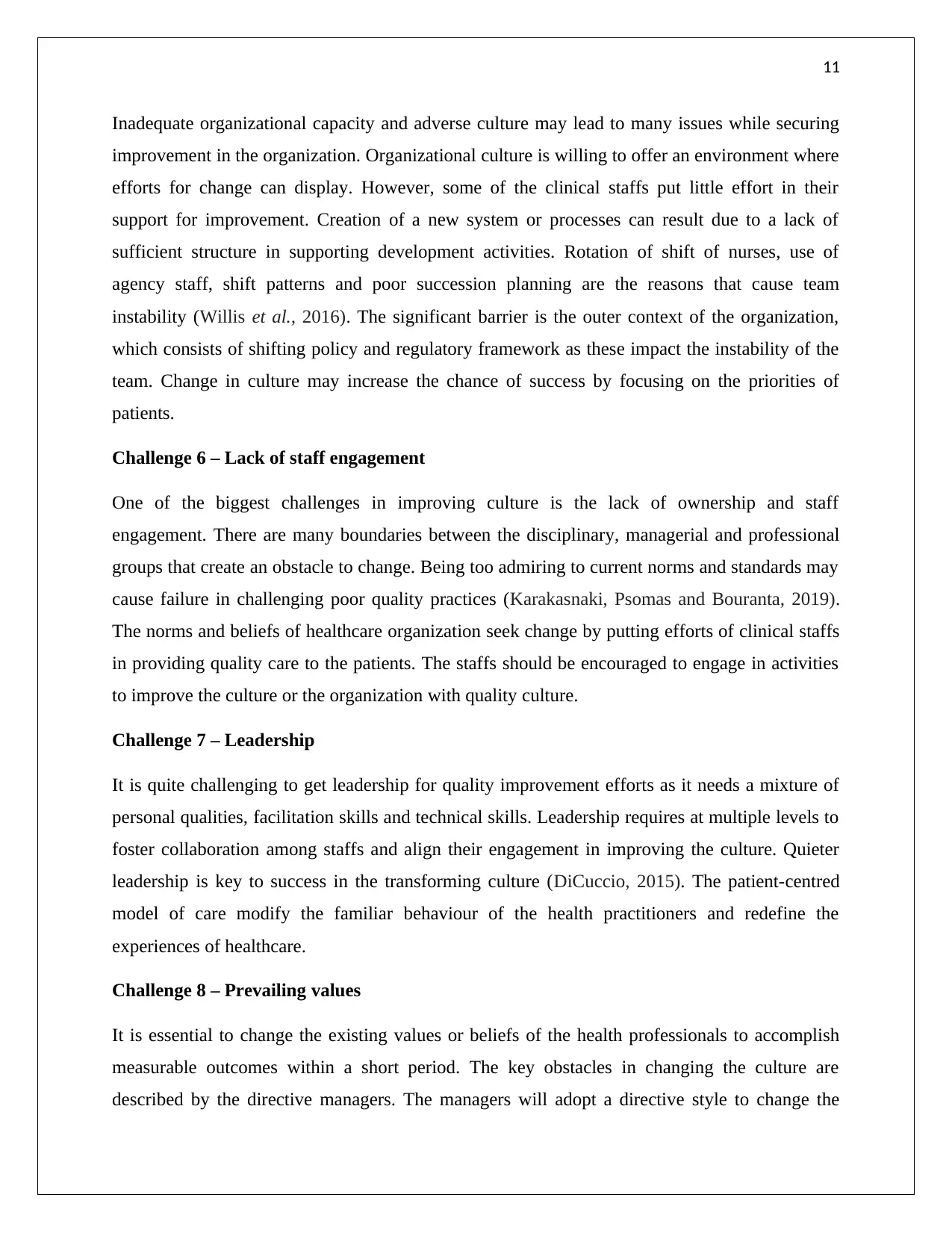
11
Inadequate organizational capacity and adverse culture may lead to many issues while securing
improvement in the organization. Organizational culture is willing to offer an environment where
efforts for change can display. However, some of the clinical staffs put little effort in their
support for improvement. Creation of a new system or processes can result due to a lack of
sufficient structure in supporting development activities. Rotation of shift of nurses, use of
agency staff, shift patterns and poor succession planning are the reasons that cause team
instability (Willis et al., 2016). The significant barrier is the outer context of the organization,
which consists of shifting policy and regulatory framework as these impact the instability of the
team. Change in culture may increase the chance of success by focusing on the priorities of
patients.
Challenge 6 – Lack of staff engagement
One of the biggest challenges in improving culture is the lack of ownership and staff
engagement. There are many boundaries between the disciplinary, managerial and professional
groups that create an obstacle to change. Being too admiring to current norms and standards may
cause failure in challenging poor quality practices (Karakasnaki, Psomas and Bouranta, 2019).
The norms and beliefs of healthcare organization seek change by putting efforts of clinical staffs
in providing quality care to the patients. The staffs should be encouraged to engage in activities
to improve the culture or the organization with quality culture.
Challenge 7 – Leadership
It is quite challenging to get leadership for quality improvement efforts as it needs a mixture of
personal qualities, facilitation skills and technical skills. Leadership requires at multiple levels to
foster collaboration among staffs and align their engagement in improving the culture. Quieter
leadership is key to success in the transforming culture (DiCuccio, 2015). The patient-centred
model of care modify the familiar behaviour of the health practitioners and redefine the
experiences of healthcare.
Challenge 8 – Prevailing values
It is essential to change the existing values or beliefs of the health professionals to accomplish
measurable outcomes within a short period. The key obstacles in changing the culture are
described by the directive managers. The managers will adopt a directive style to change the
Inadequate organizational capacity and adverse culture may lead to many issues while securing
improvement in the organization. Organizational culture is willing to offer an environment where
efforts for change can display. However, some of the clinical staffs put little effort in their
support for improvement. Creation of a new system or processes can result due to a lack of
sufficient structure in supporting development activities. Rotation of shift of nurses, use of
agency staff, shift patterns and poor succession planning are the reasons that cause team
instability (Willis et al., 2016). The significant barrier is the outer context of the organization,
which consists of shifting policy and regulatory framework as these impact the instability of the
team. Change in culture may increase the chance of success by focusing on the priorities of
patients.
Challenge 6 – Lack of staff engagement
One of the biggest challenges in improving culture is the lack of ownership and staff
engagement. There are many boundaries between the disciplinary, managerial and professional
groups that create an obstacle to change. Being too admiring to current norms and standards may
cause failure in challenging poor quality practices (Karakasnaki, Psomas and Bouranta, 2019).
The norms and beliefs of healthcare organization seek change by putting efforts of clinical staffs
in providing quality care to the patients. The staffs should be encouraged to engage in activities
to improve the culture or the organization with quality culture.
Challenge 7 – Leadership
It is quite challenging to get leadership for quality improvement efforts as it needs a mixture of
personal qualities, facilitation skills and technical skills. Leadership requires at multiple levels to
foster collaboration among staffs and align their engagement in improving the culture. Quieter
leadership is key to success in the transforming culture (DiCuccio, 2015). The patient-centred
model of care modify the familiar behaviour of the health practitioners and redefine the
experiences of healthcare.
Challenge 8 – Prevailing values
It is essential to change the existing values or beliefs of the health professionals to accomplish
measurable outcomes within a short period. The key obstacles in changing the culture are
described by the directive managers. The managers will adopt a directive style to change the
⊘ This is a preview!⊘
Do you want full access?
Subscribe today to unlock all pages.

Trusted by 1+ million students worldwide
1 out of 24
Related Documents
Your All-in-One AI-Powered Toolkit for Academic Success.
+13062052269
info@desklib.com
Available 24*7 on WhatsApp / Email
![[object Object]](/_next/static/media/star-bottom.7253800d.svg)
Unlock your academic potential
Copyright © 2020–2026 A2Z Services. All Rights Reserved. Developed and managed by ZUCOL.





